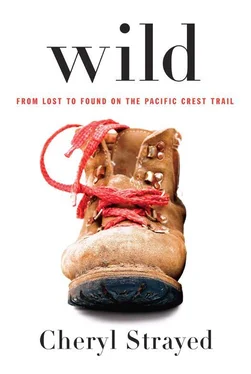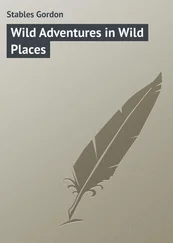Cheryl Strayed - Wild
Здесь есть возможность читать онлайн «Cheryl Strayed - Wild» весь текст электронной книги совершенно бесплатно (целиком полную версию без сокращений). В некоторых случаях можно слушать аудио, скачать через торрент в формате fb2 и присутствует краткое содержание. Год выпуска: 2012, ISBN: 2012, Жанр: Современная проза, на английском языке. Описание произведения, (предисловие) а так же отзывы посетителей доступны на портале библиотеки ЛибКат.
- Название:Wild
- Автор:
- Жанр:
- Год:2012
- ISBN:978-0-307-95765-8
- Рейтинг книги:4 / 5. Голосов: 1
-
Избранное:Добавить в избранное
- Отзывы:
-
Ваша оценка:
- 80
- 1
- 2
- 3
- 4
- 5
Wild: краткое содержание, описание и аннотация
Предлагаем к чтению аннотацию, описание, краткое содержание или предисловие (зависит от того, что написал сам автор книги «Wild»). Если вы не нашли необходимую информацию о книге — напишите в комментариях, мы постараемся отыскать её.
Wild — читать онлайн бесплатно полную книгу (весь текст) целиком
Ниже представлен текст книги, разбитый по страницам. Система сохранения места последней прочитанной страницы, позволяет с удобством читать онлайн бесплатно книгу «Wild», без необходимости каждый раз заново искать на чём Вы остановились. Поставьте закладку, и сможете в любой момент перейти на страницу, на которой закончили чтение.
Интервал:
Закладка:
But here I was, on the PCT, ridiculous again, though in a different way, hunching in an ever-more-remotely upright position on the first day of my hike.
Three hours in, I came to a rare level spot near a gathering of Joshua trees, yuccas, and junipers and stopped to rest. To my monumental relief, there was a large boulder upon which I could sit and remove my pack in the same fashion I had in the van in Mojave. Amazed to be free of its weight, I strolled around and accidentally brushed up against one of the Joshua trees and was bayoneted by its sharp spikes. Blood instantly spurted out of three stab wounds on my arm. The wind blew so fiercely that when I removed my first aid kit from my pack and opened it up, all of my Band-Aids blew away. I chased them uselessly across the flat plain and then they were gone, down the mountain and out of reach. I sat in the dirt and pressed the sleeve of my T-shirt against my arm and took several swigs from my water bottle.
I’d never been so exhausted in all of my life. Part of it was due to my body adjusting to the exertion and the elevation — I was up at about 5,000 feet now, 1,200 feet higher than where I’d begun, on Tehachapi Pass — but most of my exhaustion could be blamed on the outrageous weight of my pack. I looked at it hopelessly. It was my burden to bear, of my very own ludicrous making, and yet I had no idea how I was going to bear it. I retrieved my guidebook and looked through it, holding the fluttering pages against the wind, hoping that the familiar words and maps would dispel my growing unease; that the book would convince me, in its benign four-part harmony, that I could do this, the same way it had in the months that I’d been hatching this plan. There were no photographs of the four authors of The Pacific Crest Trail, Volume 1: California , but I could see them each in my mind’s eye: Jeffrey P. Schaffer, Thomas Winnett, Ben Schifrin, and Ruby Jenkins. They were sensible and kind, wise and all-knowing. They would guide me through. They had to.
Plenty of people at REI had told me of their own backpacking excursions, but none had ever hiked the PCT and it hadn’t occurred to me to attempt to track down someone who had. It was the summer of 1995, the stone ages when it came to the Internet. Now there are dozens of online PCT hiker journals and a deep well of information about the trail, both static and ever changing, but I had none of that. I had only The Pacific Crest Trail, Volume 1: California . It was my bible. My lifeline. The only book I’d read about hiking on the PCT, or anywhere else for that matter.
But paging through it for the first time while actually sitting on the trail was less reassuring than I’d hoped. There were things I’d overlooked, I saw now, such as a quote on page 6 by a fellow named Charles Long, with whom the authors of The Pacific Crest Trail, Volume 1: California heartily agreed, that said, “How can a book describe the psychological factors a person must prepare for … the despair, the alienation, the anxiety and especially the pain, both physical and mental, which slices to the very heart of the hiker’s volition, which are the real things that must be planned for? No words can transmit those factors …”
I sat pie-eyed, with a lurching knowledge that indeed no words could transmit those factors. They didn’t have to. I now knew exactly what they were. I’d learned about them by having hiked a little more than three miles in the desert mountains beneath a pack that resembled a Volkswagen Beetle. I read on, noting intimations that it would be wise to improve one’s physical fitness before setting out, to train specifically for the hike, perhaps. And, of course, admonishments about backpack weight. Suggestions even to refrain from carrying the entire guidebook itself because it was too heavy to carry all at once and unnecessary anyway — one could photocopy or rip out needed sections and include the necessary bit in the next resupply box. I closed the book.
Why hadn’t I thought of that? Of ripping the guidebook into sections?
Because I was a big fat idiot and I didn’t know what the hell I was doing, that’s why. And I was alone in the wilderness with a beast of a load to carry while finding that out.
I wrapped my arms around my legs and pressed my face into the tops of my bare knees and closed my eyes, huddled into the ball of myself, the wind whipping my shoulder-length hair in a frenzy.
When I opened my eyes several minutes later, I saw that I was sitting next to a plant I recognized. This sage was less verdant than the sage my mother had grown in our yard for years, but its shape and scent were the same. I reached over and picked a handful of the leaves and rubbed them between my palms, then put my face in them and inhaled deeply, the way my mother had taught me to do. It gives you a burst of energy , she’d always declared, imploring my siblings and me to follow her lead on those long days when we’d been working to build our house and our bodies and spirits had flagged.
Inhaling it now, I didn’t so much smell the sharp, earthy scent of the desert sage as I did the potent memory of my mother. I looked up at the blue sky, feeling, in fact, a burst of energy, but mostly feeling my mother’s presence, remembering why it was that I’d thought I could hike this trail. Of all the things that convinced me that I should not be afraid while on this journey, of all the things I’d made myself believe so I could hike the PCT, the death of my mother was the thing that made me believe the most deeply in my safety: nothing bad could happen to me, I thought. The worst thing already had.
I stood and let the wind blow the sage leaves from my hands and walked to the edge of the flat area I was occupying. The land beyond gave way to a rocky outcropping below. I could see the mountains that surrounded me for miles, sloping gently down into a wide desert valley. White, angular wind turbines lined the ridges in the distance. My guidebook told me that they generated electricity for the residents of the cities and towns below, but I was far from that now. From cities and towns. From electricity. From California, it even seemed, though I was squarely in the heart of it, of the real California, with its relentless wind and Joshua trees and rattlesnakes lurking in places I had yet to find.
As I stood there, I knew I was done for the day, though when I’d stopped I’d intended to push on. Too tired to light my stove and too exhausted to be hungry in any case, I pitched my tent, though it was only four in the afternoon. I took things from my pack and tossed them into the tent to keep it from blowing away, then pushed the pack in too and crawled in behind it. I was immediately relieved to be inside, even though inside meant only a cramped green nylon cave. I set up my little camp chair and sat in the small portal where the tent’s ceiling was high enough to accommodate my head. Then I rummaged through my things to find a book: not The Pacific Crest Trail, Volume 1: California , which I should have been reading to see what lay ahead the next day, and not Staying Found , which I should have read before starting the trail, but Adrienne Rich’s book of poems, The Dream of a Common Language .
This, I knew, was an unjustifiable weight. I could imagine the disapproving expressions on the faces of the authors of The Pacific Crest Trail, Volume 1: California . Even the Faulkner novel had more right to be in my pack, if only because I hadn’t yet read it and therefore it could be explained as entertainment. I’d read The Dream of a Common Language so often that I’d practically memorized it. In the previous few years, certain lines had become like incantations to me, words I’d chanted to myself through my sorrow and confusion. That book was a consolation, an old friend, and when I held it in my hands on my first night on the trail, I didn’t regret carrying it one iota — even though carrying it meant that I could do no more than hunch beneath its weight. It was true that The Pacific Crest Trail, Volume 1: California was now my bible, but The Dream of a Common Language was my religion.
Читать дальшеИнтервал:
Закладка:
Похожие книги на «Wild»
Представляем Вашему вниманию похожие книги на «Wild» списком для выбора. Мы отобрали схожую по названию и смыслу литературу в надежде предоставить читателям больше вариантов отыскать новые, интересные, ещё непрочитанные произведения.
Обсуждение, отзывы о книге «Wild» и просто собственные мнения читателей. Оставьте ваши комментарии, напишите, что Вы думаете о произведении, его смысле или главных героях. Укажите что конкретно понравилось, а что нет, и почему Вы так считаете.












